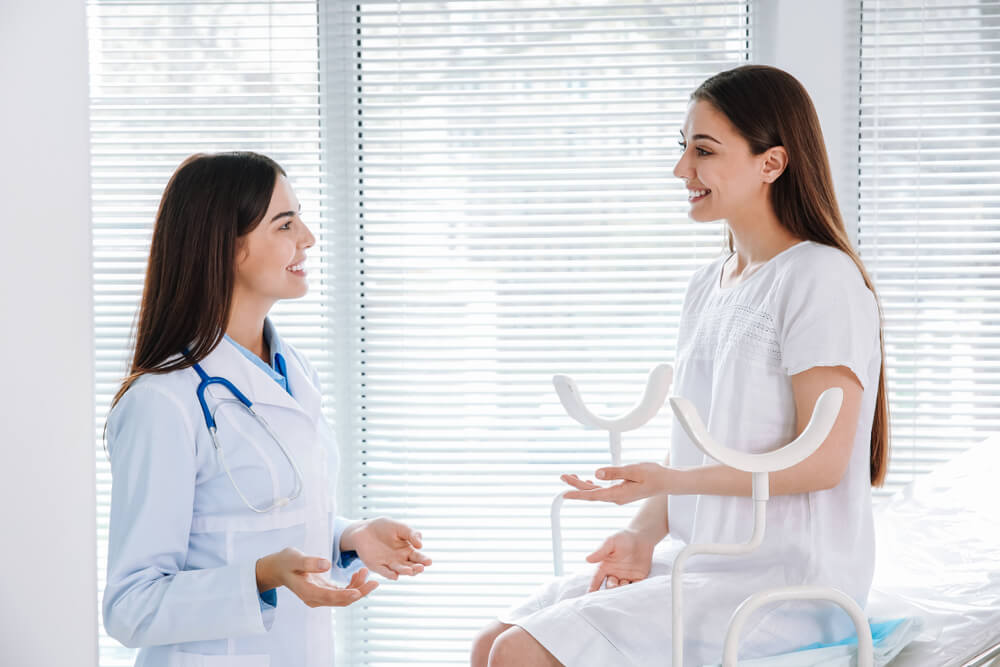The thought of the first gynecology appointment may induce stressful feelings in most women and younger girls, and being a bit anxious is nothing out of the ordinary. It’s the fear of the unfamiliar, but with the proper research and approach, you can find answers to the most prominent questions, whether you are looking for solutions for yourself or your daughter.
To make your research easier and the questions for your answers more precise, our experts in obstetrics and gynecology in South Miami, Florida, have gathered all the essentials you need to know to prepare for a first gynecology exam properly.
When Should You Have Your First Gynecology Appointment?
In most cases, providers recommend that girls and young women schedule their first gynecology exam between the ages of 13 and 17.
As experts say, the earlier women start to take care of their vaginal health and the health of their reproductive system, the sooner they will develop a habit of attending regular exams, which are essential to conquer nervousness and pressure, not to mention, it can help a great deal in keeping the patient healthy.
There’s a misconception that women should undergo their first gynecology exam after encountering vaginal health problems or becoming sexually active. In reality, there’s no need to delay these visits based only on those events.
About the Gynecologist

A gynecologist, or obstetrician-gynecologist (OBGYN), is a medical professional specializing in women’s health. They are responsible for checking your vaginal health, the health of your overall reproductive system, and your general health.
These are dedicated, compassionate, and responsible experts who are more than ready to help you with other concerns about your health. Also, as trained and experienced experts, they are very well aware of the fact that the first gynecology appointment can be stressful for patients. That said, they will do everything they can to make the first meeting more relaxed and easier.
Preparing for Your First Gynecology Exam
Feeling unease before your first gynecology appointment is normal and expected, and you should share your concerns with your provider.
Also, if you are overly worried, it’s always an excellent idea to seek some support or consult with a parent, partner, or friend.
When preparing for your first gynecology exam, it’s advisable to know when your last menstrual period started and ended, as the doctor must know. That said, permanently mark the first day of your cycle and keep regular records of your periods.
Furthermore, experts generally advise you to come prepared, as in creating a list of questions you can ask your provider before the exam. These questions may be the following:
- What kind of testing awaits me?
- Will I feel any pain?
- How often should I take these tests?
- What should I know about Pap smear tests?
- What is an annual gynecology exam exactly?
Also, it’s crucial that you tell your doctor if you are experiencing any menstrual irregularities so your provider can further assess if any more tests are necessary.
Many women and girls also wonder whether they should shave their private areas before their first gynecology appointment. Remember, it’s your reproductive and vaginal health that matters the most to your doctor; pubic hair is mostly a personal preference, and it won’t cause any problems during the examination.
Still, there are a few things you should avoid before your first visit, as they can interfere with your vaginal flora and, ultimately, the results of some of the gynecology tests.
So, to avoid anything unnecessary, ask your provider before your appointment regarding the use of creams, shampoos, and tampons and whether you should refrain from having intercourse before your first gynecology exam.
How Will Your First Gynecology Exam Look Like?
Sometimes, the first appointment is no more than just a consulting session, where your provider discusses the examinations and tests awaiting you and will schedule your upcoming appointment. Based on the first consultation, your provider will also determine whether performing the tests and exams immediately is crucial or if they can wait until the next appointment.
Also, it’s essential that your provider knows as much about your health and medical history as possible. As such, don’t feel uncomfortable if your provider asks questions about your:
- Medical history
- Family
- About your periods, their regularity, and whether you have experienced unusual and heavy bleeding or period cramps
- Whether you are sexually active, and if yes, whether you practice safe sex
Rest assured, gynecologists are all about confidentiality, so the information you share will be safe with your provider.
Naturally, in the case of teenage girls who feel uncomfortable talking about these things in front of their parents, the provider will ask the parents to leave the room.
About the Tests During the Exams
So what kind of tests do gynecologists perform during these vaginal exams?
First of all, these tests are all harmless and serve the purpose of improving your health. Also, your provider will do everything to ease any discomfort you might be experiencing.
That said, during the first appointment, providers will usually perform the following tests:
- External genital exam
- General physical exam
On the other hand, if you’ve said that you have dealt with irregular and painful periods or experienced altered vaginal discharge, itching, or unusual bleeding, your doctor might also perform a more extensive exam, including a Pap smear and a pelvic exam.
You should also know that these examinations are generally part of your annual exam. Still, your provider may also perform a breast examination that’s also crucial for your health.
About the Physical Exam

During the general physical, the provider checks your blood pressure, weight, height, and heart rate, and in some cases, the doctor may also order a blood test.
The conversation we talked about above is also part of your exam. The doctor will ask about your sexual activity, and if they suspect a sexually transmitted disease, they will also perform adequate STD testing.
You shouldn’t feel embarrassed about talking about sex with your provider. The information you tell them is crucial in helping you maintain your sexual and vaginal health. On that end, you are also encouraged to ask questions or raise concerns about sex and sexual health.
About the Genital Exam/Pelvic Exam
During the genital exam, your provider will perform a vaginal exam, taking a look at the vulva and the outer genital area, and will most probably perform a bimanual exam.
The latter involves placing two lubricated fingers inside the vagina while the provider holds the other hand on your abdominal area. This is used to check for cysts in the ovaries and uterus.
While this may all seem painful, these exams don’t hurt but may cause discomfort for the first time. Still, you should know that your gynecologist will do everything possible to ease discomfort.
About the Pap Smear
Usually, these aren’t performed before the patient turns 21 unless it’s necessary. During a Pap test, the provider inserts a speculum in the vagina to examine the cervix. With the help of a spatula and a small brush, the doctor takes a small sample of the cervical cells that will be further analyzed.
While Pap smears generally aren’t pleasant, they aren’t necessarily painful, either. Make sure that you tell your doctor if you are experiencing any pain.
Women who are sexually active will usually undergo a Pap smear once a year during their annual exam. These examinations are crucial as they are the best method currently to assess overall vaginal health properly.
Don’t Be Afraid
While most of us typically feel uneasy about medical visits and checkups, they keep us healthy and prevent any medical issues before they become more severe and more challenging to treat successfully.
Regular gynecology exams serve the same purpose. And while first-timers might find the experience overwhelming, it’s entirely normal and completely natural.
To make your first visit less stressful, we advise scheduling an appointment with caring and compassionate experts like our staff. That said, feel free to reach out to our practice so we can discuss your questions and concerns.


